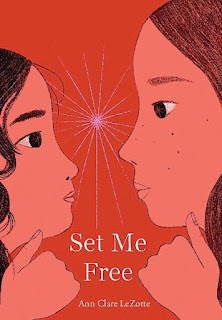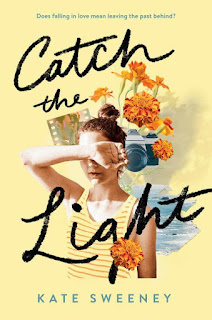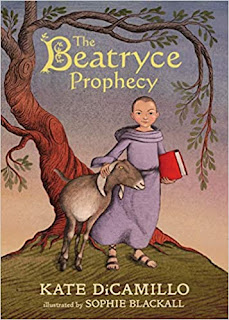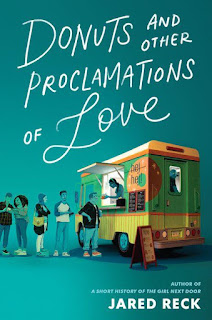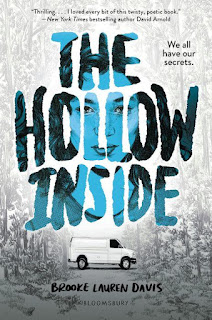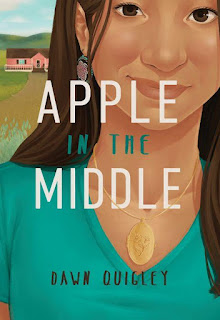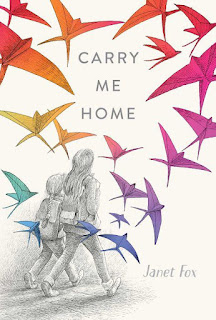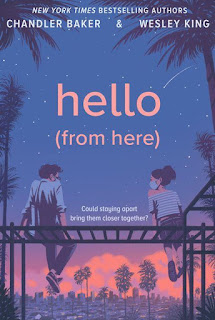While not so original as a story, Moon's quirky novel is full of original and memorable characters. The girls' (real) Aunt Lisa steals the show with her feisty and world weary outlook, but I also enjoyed the tentative romance between Eli and her best friend Meena. The exploration of alcoholism and the way it tears families apart is a great topic but is never fully developed -- which would be my overall criticism of the book (that manages to never really take things as far as they could have gone).
Monday, January 10, 2022
Middletown, by Sarah Moon
Saturday, January 08, 2022
Set Me Free, by Ann Clare LeZotte
One of a large community of deaf settlers in Martha's Vineyard, Mary has learned from her experiences that outside of her home, deaf people are despised and persecuted. She's restless living in Martha's Vineyard, but afraid of that outside world. But an old friend has written to Mary and told her about the strange feral eight year-old girl who lives at the manor house where she is serving. She begs Mary to come and see if the girl is in fact deaf and if Mary can do something to help her.
Mary realizes that she must do what she can to help the girl and so she accepts the invitation. When she arrives at the estate, she is shocked to find the girl is imprisoned, kept shackled, and frequently beaten and abused. She tries to reach out to the girl, but finds that all of her well-meaning ideals pale in comparison to the task. Humbled by the experience, Mary gradually comes to understand the girl and eventually engineers her escape for her captivity.
A much better book than its predecessor (which I will admit that I never finished), it throws light on a number of neglected facets of early American history ranging from the poor understanding and treatment of deaf people in the late 18th century to the practice of separating Native American children from their families. The woke idealism of Mary's character is gratingly anachronistic, but serves the valuable purpose of drawing attention to the norms of general society of the period. As an educational work (i.e., the sort of book one gets assigned in school) it checks off all the right boxes.
More in spite of this agenda than because of it, it's also a very entertaining book. A suspenseful story that kept up my interest and a character that gains insight and self-confidence as the novel progresses made this a much better book than its predecessor. In sum, I enjoyed the book and learned a great deal from it.
Sunday, January 02, 2022
Catch the Light, by Kate Sweeney
While built on a common YA theme (why are there so many dead parents in YA books anyway?!), Sweeney's treatment is actually pretty stand-out. That's hard to explain as everything from the sassy younger sibling to the petty misunderstandings to the inability to tell the truth are pretty much canon. But Sweeney's writing is nuanced and while situations feel very familiar, one also feels like we actually understand where Mary's behavior is coming from. In other words, this isn't paralysis for the sake of filling pages, but a story really being told. I never felt manipulated and I wasn't having my heart strings pulled at gratuitously. In fact, this isn't a story in the end that packs a huge emotional punch, but instead tells a story well about imperfect people who are trying to sort things out. Mistakes are made all round, feelings of hurt are aired, compassion is shown, and realistic forgiveness and healing develop.
Off-tangent rant: Like the mix tape, analog photography really has no place in contemporary literature. Yes, I get that dark rooms are excellent places for intimate feelings to be explored (they certainly were in the 1980s when I was a teenager!) and I see how much fun it is to use the chemical process of film development as a metaphor for emotional change. But really?! Digital photography has long supplanted the whole business. More to the point, a creative writer could probe the complexities of LightRoom and the amazing potentials in digital aesthetics and break some new ground.
Saturday, January 01, 2022
The Beatryce Prophecy, by Kate DiCamillo (ill by Sophie Blackall)
But Brother Edik has an idea of what is going on: there is a prophecy that declares "that one day there will come a child who will unseat a king. The prophecy states that this child will be a girl. Because of this, the prophecy has long been ignored." And while the prophecy is often disregarded, no one is ignoring it now. The king's men are hot on Beatryce's tail and it falls upon Brother Edik to convince her to hide. But being stubborn, Beatryce instead befriends a local boy (Jack Dory) and a former king (Cannoc) and reveals herself to the king in order to fulfill her destiny. Along the way, she drafts a fairy tale of her own that eventually supplants the prophecy of the main story in a very meta literary moment.
DiCamillo falls into extremes. She is undeniably a great writer and full of original and clever ideas that challenge and disrupt typical formulae and tropes. Sometimes this works fantastically (Because of Winn-Dixie, Flora and Ulysses) but other times the story flies so far off the rails that only adults can really enjoy it (The Tale of Despereaux). Here, it's more the latter. The story and its many layers is clever but I can't imagine children being able to keep up with it. It sounds like a children's fairy tale, but is too knowing and subtle. It's self-destructive narrative is far too aware of its own cleverness.
That said, it is a very pretty book, with beautiful illustrations (both full plates and marginalia) by Sophie Blackall. The layout and presentation is truly gorgeous and Blackall probably deserves a third Caldecott for this book. The design perfectly complements the text and makes for a handsome overall package. Aware that this is a truly outstanding work, there's even an upgraded "collector's edition" of the book featuring more of all of this, which I would be very tempted to own if it weren't for the hefty price tag and my lukewarm feelings for the story.
Sunday, December 26, 2021
Lucky Girl, by Jamie Pacton
Now, she has an even bigger problem: How is she going to collect? As a minor, she bought the ticket illegally and she can't just walk in and claim her prize. If she hands it over to her Mom, her mother will just waste it all on junk. The only person she knows who is over eighteen is her ex-boyfriend and THAT isn't going to happen! While she tries to figure out what to do, she keeps quiet about it. But her best friend Brandon is obsessed with identifying the winner and coming dangerously close to figuring it all out.
A comedic look at lottery madness. In order to find a solution to her dilemma, Jane researches what prior lottery winners have done and uncovers the various ways that good fortune has generally turned bad. The book thus is mostly a vehicle for exploring the sorts of crazy things that lottery winners do. The ending, which relies on a rewriting of assumptions, felt a bit like a cop out, but the story itself is entertaining. There are some potentially disturbing themes (death, mental illness, violence) but very little attention is drawn to any of these issues and the overall tone is light.
Friday, December 24, 2021
Donuts and Other Proclamations of Love, by Jared Reck
While taking an out-of-the-blue left turn in the final fifty pages that disrupts the story, I really enjoyed this romantic comedy. The strength of the story lays in its vivid characters. Farfar (the grandfather) is a gem and adds a wonderful foil for a story that benefits from Reck's dry writing style. Reck isn't a John Green, but he delivers a decent young male character who isn't (like most boys in male-written YA) obsessed with sex -- a feat worthy of supporting. And while Lou is largely neglected, she gets enough development to make her an intriguing person in her own right.
The story takes a bit to really get going. There is a wonderful back story involving Oscar's mother and another about Farfar's former lover that truly were criminally overlooked, but I think Reck wanted to avoid long digressions. Left as-is, the back stories provide depth without becoming integral to the story, but they do make the early pages a bit hard to follow as we are not quite sure at first where our focus as the readers should lay. And the aforementioned late development to the story really serves to hijack where the author was leading us for most of the book.
I've never seen a story that mentioned the Aaland Islands before (and even Swedish-American stories are in short supply), so this book with its focus on Scandinavian street food will serve some multi-cultural value as well.
Sunday, December 19, 2021
The Lost Language, by Claudia Mills
At that moment, Mom's work stresses build up to a crisis and Betsy reaches out to her old friend for support. But instead of reconciling, Lizard betrays Betsy.
Mills writes lots of middle grade books, but not usually in verse as she has done here. The style works in this case because the story is so centrally about language and communication, but I don't think it was essential. With few words and lots of white space, the book is a very fast read. I would not call this one of Mills's best books, but it is a good read and deals with the popular topic of the strains that a friendship goes through as children grow older in an effective and sophisticated manner.
The story features some fairly mature themes, including adult mental illness and alcoholism. These are handled in a straightforward and age-appropriate fashion. As always, it's nice to see adults being treated like real people in a children's book. It is also good to see children being treated as responsible enough to handle that reality.
Goodbye, Perfect, by Sara Barnard
With parents and police pressuring Eden for information, she finds herself in an awkward position of trying to be supportive of her friend by lying to the police about whether she is in touch with Bonnie. But the longer Bonnie is gone, the more Eden starts to question just how well she knows her friend. How can Bonnie just leave her family and friends, throw away her life, and embrace a fugitive life with a man who is twice her age?
A engaging story with enough adventure to keep the plot moving with delivering a surprisingly poignant look at a friendship being torn apart as two childhood friends grow up. Barnard is consistently strong at realistic portrayals of human relationships as seen in her other novels (e.g., Fragile Like Us, Destination Anywhere), respectfully capturing how children and adults really interact. As in her other novels, our protagonist Eden is provided a deep backstory that gives the reader a true sense of what her relationship with Bonnie means to her, all of which adds to the pathos of the way Bonnie's runner really tears Eden apart. And while minor characters can't possibly get as generous of a treatment, Barnard does take the time to fill in enough details that no one present is a throwaway -- parents get to have flaws without being caricatures, children are not always right, and so on.
It's a story that can't have a happy ending and it is not particularly inspirational subject matter, but Eden's journey to adulthood is emotionally satisfying as a story. Highly recommended.
Friday, December 17, 2021
The Hollow Inside, by Brooke Lauren Davis
Through flashbacks, the details of Ellis's original betrayal (and the complicity of the people of Jasper Hollow) is revealed. And yet, the more the reader learns about the wrongs that were done, the more everything grows murkier. Good people did bad things. And then they did worse things. The past is being revisited, but events are still unfolding and there is still time for people to make more mistakes. By the time the story ends, no one is going to get what they truly want.
The thing about tragedies is that they are not particularly fun to read. Or rather, the "fun" of reading comes from the realization of the inevitability of the story: a well-written tragedy in other words writes itself, which what happens here. Events unfold effortlessly and each new page fills the reader with dread -- the proverbial train wreck. That Davis is able to exceed expectations and pile tragedies beyond my imagination (without creating a melodrama) is testament to a well-constructed story with sound foundations. With that effort upfront, the author exploits vengeance and fate for maximum effect.
This is a story where every major character has a purpose. Ellis is the guilt-ridden king. His wife the long-suffering queen who knows all but remains steadfastly loyal. Ellis's pastor tries to protect them both but not out of any loyalty; he has his own guilt to avoid. With the adults carrying heavy parts of the backstory, the dramatic weight of the current moment falls heavily on the kids. The relationship between Phoenix and Ellis's daughter Melody is particularly central. There's not much romantic heat between them, but as representatives of the two sides of this conflict, they are a junior version of the conflict between Ellis and Phoenix's Mom. Well-developed characters, they have a nice spark between them that makes their romance just another layer of complexity in a story without much time for love.
A compelling tragedy with strong characters and an engaging narrative. Dedicate the time to finish the last hundred pages in one sitting.
Wednesday, December 15, 2021
Apple in the Middle, by Dawn Quigly
One summer, her parents decide that she needs to get to know her mother's family better and they send her out to the Turtle Mountain Indian Reservation in North Dakota. Out there, she meets her relatives, learns more about her mother, and connects with her culture, changing her life forever.
A fairly predictable undertaking used as a vehicle to explore Ojibwe culture. Despite that rather clumsy undertaking, this is a nuanced piece that occasionally lapses into an overly "teachy" (pedantic) style but has its heart in the right place. The usual pitfalls of noble Indian or oddball life on the Rez are noth avoided. Instead, it's a story with a lot to impart about the complexity of life for contemporary Native Americans. I learned a lot through reading it. At times, the story itself suffers from this grander purpose and loses its dramatic momentum, but it's not dull or dry. Apple herself, who seems to have some traits of ADHD, is not always a likeable protagonist and seems overly quick to assume the worst of people, but ultimately is intelligent and insightful. Her struggles to understand her family and their culture provide us with a sympathetic guide and help open up this fascinating culture. A flawed but unique and valuable book.
Monday, December 13, 2021
The Last Cuentista, by Donna Barba Higuera
Petra loves to tell cuentos and dreams of becoming a storyteller like her grandmother. But destiny is about to seriously disrupt this innocent dream. With the Earth about to be destroyed by a comet, a very small number of people have been chosen to board spaceships that will take them on a nearly-four-hundred-year journey to a distant hospitable planet in order to rebuild. Petra's family are among the chosen ones. They will sleep in suspended animation for the duration of the voyage, tended by monitors who will spend their lifetimes taking care of the ship, passing along their responsibilities to their children and grandchildren. It will take many generations of these monitors until the ships reach their destination.
Years later, when the ships reach the end of their trip, Petra is awoken to discover that things have gone horribly wrong. A totalitarian Collective has taken over the ship and enslaved everyone in the name of achieving a stifling consensus. To maintain the control, the leaders use a combination of sedatives and ignorance. Key among their policies is forgetting everything about the past and so they systematically erase the memories of the sleepers when they bring them out of hibernation. No one can be allowed to remember how life was on Earth. Instead, all thoughts must be focused on the Collective and its current mission. For some reason, Petra proves resistant to attempts at wiping her memories and she sets about covertly to undermine the regime. Using her talents as a storyteller and her memories of Earth, she tries to enlist allies and save humanity.
Part Gabriel García Márquez and part Ben Bova (i.e., The Exiles Trilogy), Higuera creates a unique Hispanic-flavored science fiction story. The narrative is uneven, with frequent flashbacks to Petra and her time on Earth jarring the narrative flow. The overall depressing nature of the story (i.e., end of humanity) is not fully balanced with the optimistic message of Petra's cuentos and a very open endings leaves much of the dilemma unresolved. Petra's stories (adapted from traditional folk tales) do not always align with the ongoing action.
As science fiction, then, the story does not always manage to be a success, but the deeper message of the importance of oral history and culture as the root of what makes us human is powerful and quite moving. Marketed to middle school readers, the serious themes and the upsetting nature of the material probably make it more appropriate for an older audience.
Saturday, December 11, 2021
Carry Me Home, by Janet Fox
And then one day her father doesn't come home.
He did this once before, back when they lived in Texas. It was shortly after their mother died and he just got so sad that he had to go away. It was a month before he returned, but the girls managed on their own. And Lulu understands that it is best that way. If people start to notice that your Daddy is missing, they call social services and the kids get taken away (and probably separated). Lulu wants to avoid that at all costs. But as the days go by, keeping things together gets harder and harder and nosy adults begin to wonder where the girls' father is. Twelve year-old Lulu is running out of ideas for how to prevent people from finding out. And also running out of the means to keep her and her sister safe.
I've never been a fan of child abandonment stories or understood why so many of them get written. The solution is obvious enough (adults find out and foster care turns out not to be as bad as the child imagined). Dragging out that inevitable conclusion just seems like child abuse to me.
Setting aside that bias and preconception, this version of the story has some nice features to it. Lula shows great resilience, taking care of her sister and even finding some time to have some fun. I especially like the kindness of the people with whom Lulu deals It's not just the expected kindness of the local librarian (which is sort of a requirement, no?) but lots of kind adults and kids as well. Even a classmate who initially teases Lulu turns out to be a generous friend. It must be something about Montana (where the action takes place)! In any case, the positive, community spirit of the setting helps to buffer the traumatic nature of the material. A happy ending helps as well.
Friday, December 10, 2021
Hello (From Here), by Chandler Baker and Wesley King
All in all, an awkward time to kick off a romance, but life (as it has become) marches on. Max is trying to make ends meet as a personal shopper, bringing quarantined people their groceries. Her mother's dry cleaning business is grinding to a halt as people no longer need to clean their suits and dress slacks. Meanwhile, Jonah ostensibly only has to deal with the cancellation of his long-planned trip to Paris this summer and the fact that his Dad is stranded in Spain. But underneath these stark class differences, Max and Jonah share a great deal in common and as they endure those uncertain first months of the pandemic, their relationship undergoes unusual stresses and strains.
I've been waiting for a decent YA romance set in the contemporary moment for the simple reason that all of the traditional ones feel so unrealistic in today's world (where even kissing seems unwise). Baker and King do an incredible job in capturing the mood of the times in a way that will make this book a go-to for young readers in the years to come trying to understand life in 2020. Is it too soon for historical YA of that period? No, I don't really think so. Children's literature is as much about helping young people connect to their world as entertaining young readers. What could be more relatable to a teenager right now than other young people trying to navigate a relationship that takes place with masks on and six feet apart?
Unfortunately, I found the story itself to be dull and aimless. Reminiscent of Nick and Norah's Infinite Playlist with its meandering unstructured format, this is a story that really does not have a goal. There are a number of ideas (absent parents, illness, and poignant subplot about a famous movie director, rescuing a shelter dog, etc.) but no consensus about where to take the ideas. It reads like two established writers with not-entirely-compatible styles that are playing literary tug-of-war. Characters and situations introduced by one are pointedly ignored by the other. For a team-written novel to really work, you need collaboration, which inevitably means re-writing large sections after you reach the end to make the exercise into a story. This book is far too rushed to do that serious editing process. The end result is simply boring.
So, not great literature, but fascinating material. Hopefully, it will inspire others to tackle the subject.
Sunday, December 05, 2021
Faceless, by Kathryn Lasky
In the waning days of World War II, Alice and her parents are sent to Berlin to help assist an attempt to murder Hitler. Passing herself as Ute, a star student, she infiltrates Hitler's inner circle. The plot (based on a real event) ultimately fails, but Alice gains firsthand knowledge of life in Hitler's bunker. She also befriends a Jewish boy who is hiding from the Nazis and helps him survive.
Throughout her mission, Alice is distracted with worry about her older sister. Just prior to leaving for Berlin, her sister retired from service and declined to join them in Germany. Instead, she went to work as a codebreaker at Bletchley Park. To her shock and amazement, Alice starts to catch glimpses of a young woman on streets of Berlin who looks like her sister. Tracking that woman down reveals even further surprises.
The adventure is a bit too rushed to develop any strong feeling of suspense, but the story is rich with details that will be inspirational for further reading. That strength can also prove to be a weakness when we get so bogged down in the details that there is not much room left over for story.
I was less taken with the subplot involving the Jewish boy and the mysterious sister. The boy turns out to be largely inconsequential to the story and Alice's sympathy for him seems out of character and distracting. It is also anachronistic -- glossing over the anti-Semitism of the period -- which is striking given the otherwise strong devotion to historical details. The sister's story sticks out uncomfortably because it is neither well set-up in the beginning nor really effectively resolved at the end. It also added little to the story.
The Rasa concept is a rich jumping off point for any number of adventures and one hopes that Lasky will take other points in history and give them the same treatment.
Thursday, December 02, 2021
You & Me at the End of the World, by Brianna Bourne
What would you do if you had the world to yourselves? Neither Hannah nor Leo really know, but having the whole city to themselves, they are free to explore. With an absence of any other human life, they also compare notes about their lives up to now. The abandoned streets of Houston invite self-reflection.
Before this happened, they knew of each other, but definitely moved in different circles. They are both seniors, about to embark on their real lives. Hannah is on the verge of becoming a professional ballerina. Leo, while a talented musician, seems destined to screw up his latest opportunity. In an empty world, however, what future is there for a dancer and a guitarist?
An unusual story about what it would be like if all of the world's distractions were to disappear and you could really get to know another person. I enjoyed the post-apocalyptic feel of an deserted Houston, but the implausibility of the scenario grated on me. First of all, because there was little in the novel to give me a sense of place (Bourne made very little effort to bring up landmarks or invoke anything particularly Houstonian -- it may be a huge metropolis, but it definitely has plenty of local character!). Secondly, because there is no way that a place would function very long if the entire living population suddenly disappeared.
As the story progresses, rather than address the implausibilities, Bourne stresses her protagonist's inner turmoil and pulls the characters into an emotional breakdown. The story gets bogged down in insignificant chat. The story's eventual resolution is a complete let down, especially given the potential of the premise. It is all worsened by meaningless side trips (out to grandmother's house and later to a house party) that seem designed mostly to fill pages than to develop characters or move the story along. Disappointing.
Monday, November 29, 2021
Salty, Bitter, Sweet, by Mayra Cuevas
That dedication to her craft is precisely what drives her crazy about lackadaisical (but infuriatingly attractive) Diego. He's lazy and carefree, with no serious ambitions of his own. Worse, he's staying at the house as he's the stepson of her stepmother. Managing the intensity of her culinary program and keeping Diego out of her hair and her heart is enough to drive her crazy. But, of course, opposites attract.
As she warms to Diego and appreciates his more relaxed approach to life, she also discovers that maybe studying to become a master chef isn't what she wants after all. If only her grandmother was still alive to offer her guidance. All she has of her is her grandmother's cookbook, which she can't bring herself to open and read.
An engrossing story of fine food, dedicated culinary arts, and a general sense of how dysfunctional world culinary fame can actually be. Lot of details for dedicated foodies and enough fun stuff to keep even us amateurs enraptured and hungry. However, I have a bone to pick about Isa's taste in guys. I found Diego really hard to take at first. I get that we're supposed to root for him and see Isa as unbalanced and uptight, but I couldn't get past how inconsiderate he was about the things that mattered to Isa. It's only fairly late in the book that Isa starts coming around to the notion that she herself might be a bit too high strung. At that point, Diego's arrogance starts to look a bit more like care and concern, but that doesn't change the way he fails to respect the things that are important to Isa. That she finds her true calling at the end is small comfort since it seems to require that Diego be part of the package.
Wednesday, November 24, 2021
Big Boned, by Jo Watson
When Lori's autistic brother needs to move to a new school, it's exactly what her mother needs as well: leaving Joburg and moving to Cape Town and starting again. There, Mom buries herself in her new career, generally ignoring them and leaving Lori with the responsibility of taking care of her brother. While Lori is happy that her brother is getting the help he needs, Cape Town's sporty vibe is not for her. Her new high school is all about water sports and Lori can't stand athletics and fears the water. But some of that could change thanks to Jake, a friendly water polo captain. He would normally be out of her league, but his attention-deficit younger sister attends the same school as Lori's brother and the younger siblings have become fast friends. It doesn't take long, to Lori's surprise, before genuine sparks ignite between her and Jake as well.
With some support from Jake, another girl in Lori's class who aspires to design clothing for plus-size women, and a witty counselor, Lori learns how to deal with her fears, embrace her aspirations, and confront her mother. Along the way, she discovers an aptitude for street art. The result is a winning story about believing in yourself and overcoming your fears.
Jo Watson is a revelation. While covering familiar ground and all the usual scenes (the mirror, dress shopping, binging, and bullying) that one would expect in a story about a full-bodied young woman, Watson quickly leaves that behind and shows Lori really grabbing on to self-improvement. She has her insecurities, but they really don't stop her from trying (and succeeding!) in shedding them. All of this success can make the novel seem unrealistically rosy (so much so that the protagonist even complains at one point that things like this don't happen "unless we're in the pages of some unrealistic YA book that totally throws social conventions out the window and sets itself in this totally made-up world where fat girls win and the guy looks past all her cellulite and sees the girl inside"). Yes, Lori, that's basically what this story is...and it's a winner!
As an aside, I don't believe that I have ever read a YA novel by a South African writer. The different settings were a mildly disorienting, but pleasant change. For while I've visited SA, I tend to see it only through a political lens. I'm happy to report that angst-ridden adolescence is pretty much the same (if not better) there!
Sunday, November 21, 2021
Hot British Boyfriend, by Kristy Boyce
While the academics are far more rigorous than she's prepared for, she seems to get her wish pretty quickly when she meets Will at a flea market. He's not only gorgeous but also insanely rich, shuttling her around in his Jaguar and taking her out for fancy dinners at posh places. But Ellie is never quite comfortable in his presence. He's so much better than she is and she expends all of her energy trying to impress him and prove herself worthy.
All the time she is trying to impress Will, she is missing out on her friends, her chances to get to know England, and the things that are really important to her. And, in that pesky way that romances do, there's a sweet quiet boy in their group that Ellie can't quite seem to forget. Dev is understanding, patient, and supportive. And while he isn't British, maybe she needs to stop and think about what she really wants in the boyfriend?
No surprises and none expected, but I found this romance a bit more cringeworthy than normal. Ellie comes across as shallow, throwing away her unique opportunity to study in England in the name of chasing a boy (a boy who doesn't even come across as worth it). It's easy enough to toss Will aside in the end because the relationship between Ellie and Will seems so superficial. While it is fine to hate the bad choice and be rooting for the good one, I found myself actually hoping that poor Dev would wake up and realize that Ellie herself wasn't that much of a prize. All of which begs the question: if you don't like the protagonist, how exciting can the romance actually be?
Friday, November 19, 2021
Transcendent, by Katelyn Detweiler
Reeling from the trauma of the event, people are desperate to find meaning in the loss. A father of one of the victims tracks down Mina and her now grown daughter Iris. Believing that Iris is a Messiah, he insists that she has to cure his dying daughter. And when she refuses, he outs her to the public. The ensuing media storm as fanatics on both sides come out of the woodwork. Believers want and demand her help. Refusing to believe her protests that she is nothing special, they respond violently to her refusals to help and then just as badly to her failures. Meanwhile, others claim she is a fraud and want to punish her.
Frightened by this mixture of adoration and hatred, Iris runs away, trying to sort out what she should do. She finds unlikely help in the guise of Zane, a boy at school with a troubled background. After much deliberation, she figures out her path forward.
Put a strong stress on that "after much deliberation." The book starts off strong as it unveils a turbulent America that is well-primed for a savior. Iris's reluctance to take on that role (especially with the threatening behavior of those who would follow her) is understandable, but Detweiler doesn't seem to know where to go with this. Instead, the book drags down as Iris waffles back and forth, ignoring advice and generally repeating herself. By the end, even the solution seems weak.
In sum, a promising premise but one which the author doesn't really seem to know how to resolve. And certainly not needing 400+ pages to resolve.
Wednesday, November 17, 2021
Denis Ever After, by Tony Abbott
While the case was never resolved, Denis was murdered and Matt wants to know who did it and why. The two boys tackle the mystery using clues dug up by Matt and his friend Trey. Denis who initially can't recall anything, finds his memory being jarred loose by revisiting the scenes of the crime and the mystery gradually is resolved. However, time is running out. With every visit he makes to his brother, Denis is putting his own soul in jeopardy.
Denis is no Patrick Swayze and Matt is no Demi Moore, but you know this story well enough. I didn't always follow the plot developments, but the mystery unfolds at a nice pace keeping us wondering until the end what really happened to Denis. I personally didn't find the story all that compelling. The boys are pretty whiney and their parents are grating and annoying.

